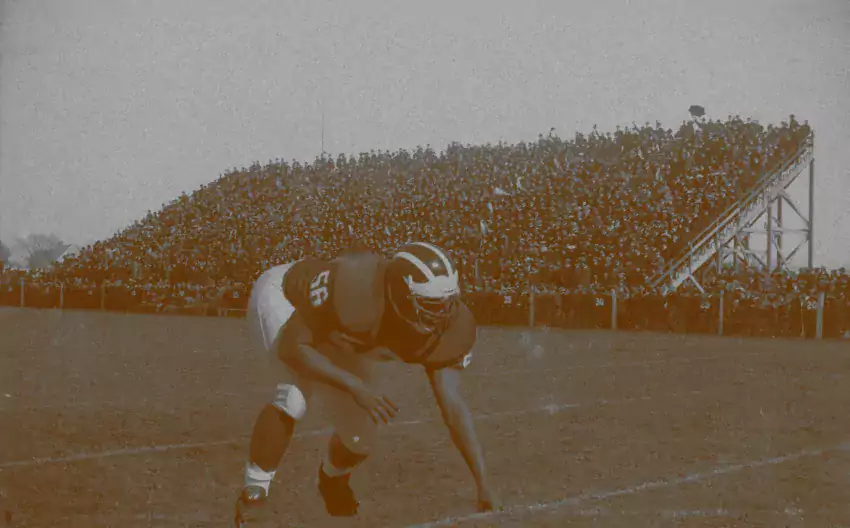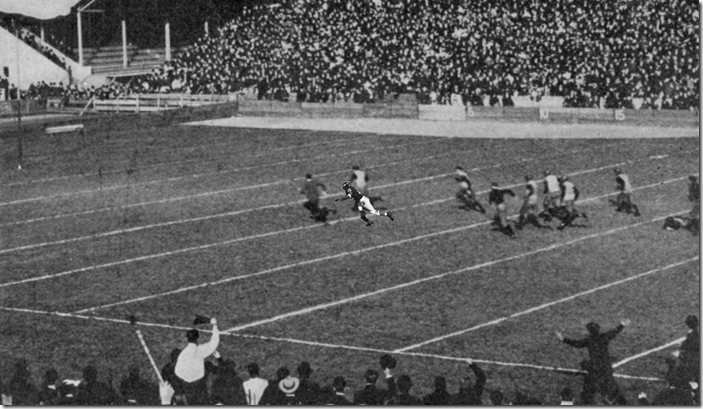1902-minnesota

What is this? A tournament of great Michigan teams past as some gimmick to write about Old Blue over the offseason. I write up a fictitious game between two historical Michigan teams, then eulogize the loser. See the play-in round for further explanation.
Since Tom Brady’s career is now just adding some fourth quarter padding to his lead on Montana, I figured we should go back to the beginning of it. It also gives me an opportunity at the start of this series to decide what I’m going to do when a team from the Stone Age faces one from modern times who just thinks it's from the Stone Age. In truth I think it would be a slaughter, like varsity versus the club team. For the sake of keeping things interesting I’m going to set some ground rules:
- To deal with changing rules, the 1st half is played under the lower seed year's rules, and the 2nd half under the higher seed's rules.
- Old time teams will be treated like they're on a sliding scale of modern subdivisions, so for example the 1901 team will be treated as if it just romped through Division III. In general, pre-1880s=Club, pre-1916=D3, pre-War=D2, pre-1980=FCS, and late 20th century=mid-majors. This is probably inaccurate, but I don't want to punish old teams too much for existing before the University of Michigan invents time travel.
- Injured/suspended players can participate equivalent to the % of the season they played, for example the 1998 team gets Marcus Ray for about a quarter.
- I can cheat for narrative purposes
Here's the bracket, which was made by a phantom NCAA committee we can all agree doesn't know anything about these teams (because I haven't written about them yet):
---------------------------
Round of 64: 1902 (7-seed) vs 1998 (10-seed)
Willie Heston outpaces 1998 safety DeWayne Patmon, because unfair characterizations of DeWayne Patmon's speed are pretty much all anyone remembers about DeWayne Patmon
Both of these teams had to follow national championship seasons, and combined most of those loaded rosters with unprecedentedly good recruiting classes. The 1902s had a much tougher act to follow, as their immediate predecessor (Yost’s first) outscored opponents 555-0. They also returned more, including Willie Heston, one of the best backs in the game’s history. Understandably, the 1998s would feel confident about beating 34 doughty white guys.
At first glance it didn't look very competitive. The 1998s had five offensive linemen over 300 pounds, including sophomores Jeff Backus and Steve Hutchinson, while the 1902s were proud of the fact that their average weight was just 180. Hayden Epstein booted the opening kickoff through the uprights, and a gaping Yost had to be informed that under 1998 rules no points were awarded for that.
The 1998 team built up a solid-enough-looking 9-0 lead in the first half, keyed by two 3rd and long conversions by Tom Brady to Markus Knight and Tai Streets. But the 1902s had the C-Will/A-Train running game scouted well, as the small but fearless Yostmen frustrated 1998 Michigan’s blockers with a seven-man front and diving into gaps. Carr extended the frustration to the fans by refusing to throw the ball despite having Tom friggin’ Brady against eleven dudes who’d literally never seen a forward pass.
The 1998s also kept having to start deep in their own zone. The 1902s managed to pin their afterbears back with a pair of gorgeous 60-yard punts by Everett Sweeney. They also were able to churn out a few first downs each drive, with Jim Herrman's '98 defense persistently confounded by Yost's no-huddle, high-tempo offense. The hurry-up forced Carr to burn all his timeouts early, and that contributed to his decision to run then take a knee when the '98s got the ball back on their 30 with over a minute remaining.
“They’re completely immune to deception,” said Lloyd Carr as his team went into the locker room for halftime. “Even our go-to screen pass wasn’t working.”
“That’s because I invented it,” quipped Yost.
[After the JUMP: The second half under 1902 rules, and one of these teams is eulogized]


18